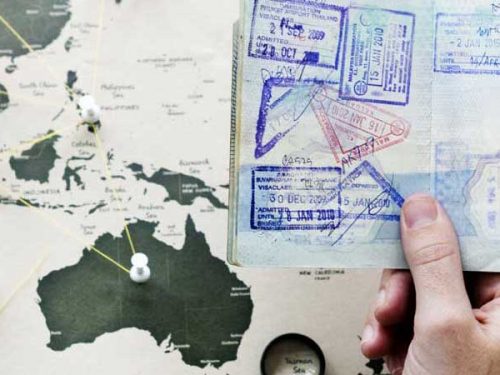Planning and packing for a vacation can always be a little stressful. Over the last 20+ years in business, we have helped work with clients to ensure that they have a stress-free vacation. To help you plan and prepare for your next dive vacation we have compiled our 20 best dive travel tips to make your dive vacation and smooth and enjoyable as possible.
Here Are Our 20 Best Dive Travel Tips For Your Next Dive Vacation:
- Dive Travel Insurance: Make sure it includes emergency medical coverage, including diving accidents, cancellation and trip interruption coverage. This is especially important if you are travelling on 2 or more separate tickets, flying on smaller regional airlines, or are moving around a fair bit. Do not assume that your credit card will cover you, as it will be very limited. Call the credit card company and ask lots of questions. Your dive or camera gear is best insured through your home owners insurance. If anything should happen (i.e. theft, medical emergency, missing luggage), make sure you get written reports from the authorities and keep any receipts of costs you may incur.
 Trip planning: Plan to arrive a couple of days before diving begins, especially if you’re taking a Liveaboard trip, just in case of airline or baggage delays. It also helps you to acclimatize. Don’t count on last minute deals – dive trips are best planned far in advance. You can get good specials during some of the major Dive Shows.
Trip planning: Plan to arrive a couple of days before diving begins, especially if you’re taking a Liveaboard trip, just in case of airline or baggage delays. It also helps you to acclimatize. Don’t count on last minute deals – dive trips are best planned far in advance. You can get good specials during some of the major Dive Shows.- Your passport requires a validity date of 6 months after your intended return date for many destinations. Ensure you have at least one or more empty pages. Take an extra moment each time after you present your passport (i.e. check-in, immigration, gate check), return it to your travel wallet and put it away safely. You will be glad you did when others are frantically looking for their passport. Do NOT put it in your coat or pants pocket. Make several copies of your passport, leave one at home and put a copy in each travel bag. Take a picture of the main page of your passport with your smart phone.
- Your travel documents: While almost all tickets are electronic these days, make sure you have a printed version of your eticket with you. There are many cases, especially in remote areas, when airline staff need to see your ticket number and/or record locator, and you may not have internet access at that time.
- Dive Conditions: Inquire about water temperatures for your trip – better take a hooded vest, tropical hood or thin wetsuit for layering. It’s no fun being cold on a dive! Repeat dives, like 4 dives per day for 5 days in a row, will lower your core body temperature substantially.
- Dive Courses: If you haven’t dived a year prior to your trip, consider taking a refresher, or continuing education course from your local dive shop before your vacation. This is also a great time to be sure your equipment is functioning properly. Ask for your paperwork – and possibly homework – well in advance of your trip. This way you don’t spend precious vacation time studying. Additionally, if you need a doctor’s signature for the training agency’s medical forms you can take care of it prior to your trip.
- How to Pack: Only take with you what you can comfortable carry or manage on your own. Select the absolute minimum you think you need for clothing – and then take only half. It will still be enough! Many resorts & liveaboards offer laundry service. If traveling with a partner, consider packing half of your clothes in each other’s checked bag. In case of a delayed or missing bag, your chances of having at least half of your clothing are a lot better. Pack your regulator, computer, camera, medication and other valuables in your carry on – do not check them in. But be aware of carry on rules with the airlines.
- What else to Pack: Bring lots of ziplock bags (get a few extra large ones for clothes), as well as at least one large garbage bag. There’s nothing worse than having to pack away wet or damp dive gear that did not have enough time to dry off. Take lightweight, quick dry clothes you can hand wash. Bring ear plugs – you don’t want engine noise or a snoring roommate to ruin your sleep and next day’s diving.
 Dive Gear: While many Liveaboards and resorts offer dive gear rental, we highly recommend to bring your own gear. Make sure your regulator is compatible with local equipment, like tanks. Most tropical destinations use yoke valves, but it is best to be sure. Get your gear serviced well in advance of your trip by a reputable dive shop. If it’s new, try it out in a pool. Consider upgrading your equipment with new lighter models to save on airline baggage fees. For example:
Dive Gear: While many Liveaboards and resorts offer dive gear rental, we highly recommend to bring your own gear. Make sure your regulator is compatible with local equipment, like tanks. Most tropical destinations use yoke valves, but it is best to be sure. Get your gear serviced well in advance of your trip by a reputable dive shop. If it’s new, try it out in a pool. Consider upgrading your equipment with new lighter models to save on airline baggage fees. For example:
- Full foot fins with fin socks rather than open heel with booties.
- Lightweight Travel BCD & regulator
- Alternate inflator regulators instead of octopus 2nd
- Flex hoses for regulator
- Rechargeable batteries
- Small wrist computer with small pressure gauge, or hose-less air integrated computer to eliminate high pressure hose.
- And even though you need to carefully consider what to pack, it’s a good idea to bring a few spares: fin strap, mask strap, mask, batteries, small light.
- Certification Cards & Logbooks – don’t forget to bring along proof you are certified. You don’t have to bring every card, but consider that an Advanced or Deep Specialty cert card will allow you to do deeper dives and you probably won’t be able to access Nitrox without that card. Logbooks are the same. They can be used to show you have recent and/or plenty of dive experience but if you have filled 5 of them, maybe just bring the most recent.
- Medication and vaccinations: Explore well in advance of your trip if your destination requires specific vaccinations by visiting a travel clinic. Some vaccinations need to be taken weeks before your actual trip. As a general pre-caution, we always advise travelers to have Twinrix (Hep A + Hep B), Tetanus and Typhoid up to date. Bring basic medications with you, such as motion sickness meds, probiotics, nasal spray, antihistamines, Imodium, and cold meds – the destination may not carry those items.
- Airline Seats: Always reserve a seat at time of booking. The longer the flight, the more attention you should pay to getting a decent seat. Even if only a middle seat is available, select one anyway. If a flight is overbooked, the airlines use the excuse to bump you off the flight if you don’t have a pre-assigned seat. To snag a coveted exit-row seat, arrive at the airport early for check-in, since you can’t always select those seats online.
- Avoid Long Lineups: Consider enrolling in Nexus (Canadians) or Global Entry (Americans). For a nominal fee you receive the bonus of “Known Traveller Numbers” and “TSA pre-check”. This program allows-pre-screened passport holders to access expedited entry through customs and immigration when travelling out of Canada and the USA as well as upon your return. It is valid for 5 years.
- Navigating Airport Security: Divers travel with items that are a little unusual, such as a regulator (which we recommend you pack in your carry on). This will likely prompt a manual inspection – pack in a way that items can easily be inspected. Wear clothing without metal, no heavy jewelry, and shoes that can be quickly removed. Your liquids and gels should be in containers smaller than 100ml/3.4oz, all in one ziplock bag. Have your laptop quickly accessible, so it’s easily removed from your bag for inspection.
- Lost luggage: Don’t leave the airport until you have a written report from the airline. Prior to departure, take a picture of your bag(s) with your smartphone – should the baggage go missing, it is easier to explain what it looks like if you can show a picture. Don’t forget to label your bag on the inside as well – luggage tags can easily tear off.
- Money considerations: Don’t carry all your cash in one place. Especially when shopping in markets, have a few small bills in one pocket or small wallet, so that you don’t need to pull out your filled wallet for small purchases. Ladies, protect your purse and men, keep your wallet in your front pocket. Commit to memory a simple math process for converting your currency to the local currency so you do not underpay or overpay. Carry some local currency, which can be easily obtained from local ATM machines at most airports. Be aware that use of your credit card on many Liveaboards and small dive resorts triggers a fee of 4-5%. Use cash for tipping and put a dedicated amount aside at the beginning of your trip.
 Local Customs: “When in Rome – do as the Romans do”. Remember: you’re in a foreign country with foreign foods, customs and language. Respect their culture and learn how to say “Thank you/You’re welcome”, “Good morning/day/night” in every language – you will have a much better time.
Local Customs: “When in Rome – do as the Romans do”. Remember: you’re in a foreign country with foreign foods, customs and language. Respect their culture and learn how to say “Thank you/You’re welcome”, “Good morning/day/night” in every language – you will have a much better time.- Consider the Environment: Be environmentally conscientious. Observe marine rules. When diving: “Take memories, leave only bubbles”. Many developing countries have difficulties with garbage disposal and have an overabundance of plastic bags. Do your part with minimizing garbage. Use biodegradable shampoo and soap, and rechargeable batteries. Do not leave behind batteries, as many developing countries are not recycling them.
- Managing Jet-Lag: Most of us find it easier to travel west, and much harder to adjust to a new time zone when travelling east. Upon arrival, adjust immediately to the expected activity of the time zone you’re in. In other words: don’t go to bed at 3pm, even if you’re really tired. Don’t think about what time it is at home – a lot of the jet lag experience happens in your head. If you can’t sleep through the night, consider taking Melatonin for a couple of nights.
- Enjoy the journey: Some of our most enticing destinations take days to get to: don’t stress out about it, consider this part of your vacation. Load up your Kindle or phone with books from your local library, update your playlist with your favourite music, consider some remedies that will help you sleep, bring ear plugs and an eye mask – and enjoy people watching.
Whether you are setting off to the frigid waters of Antarctica to dive with the fur seals or the balmy waters of Indonesia to surround yourself with big pelagics and unusual marine life, these 20 best dive travel tips will ensure that your vacation is nothing short of an amazing adventure.







